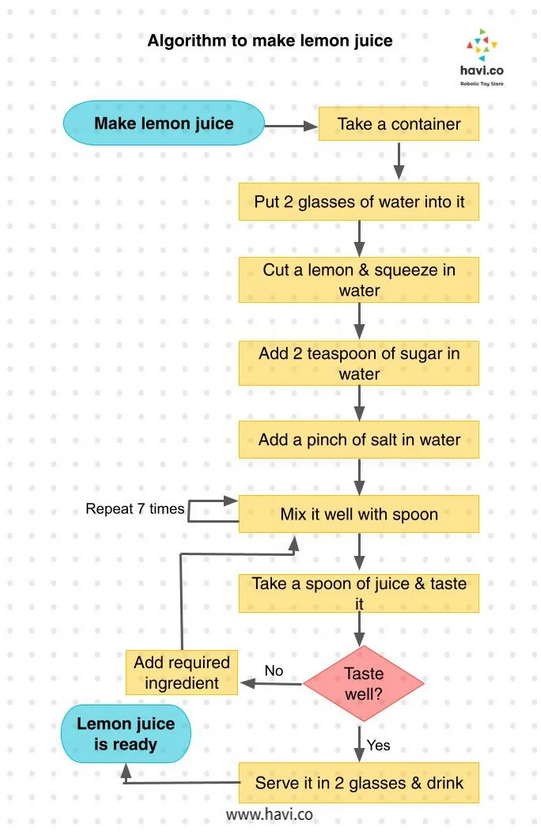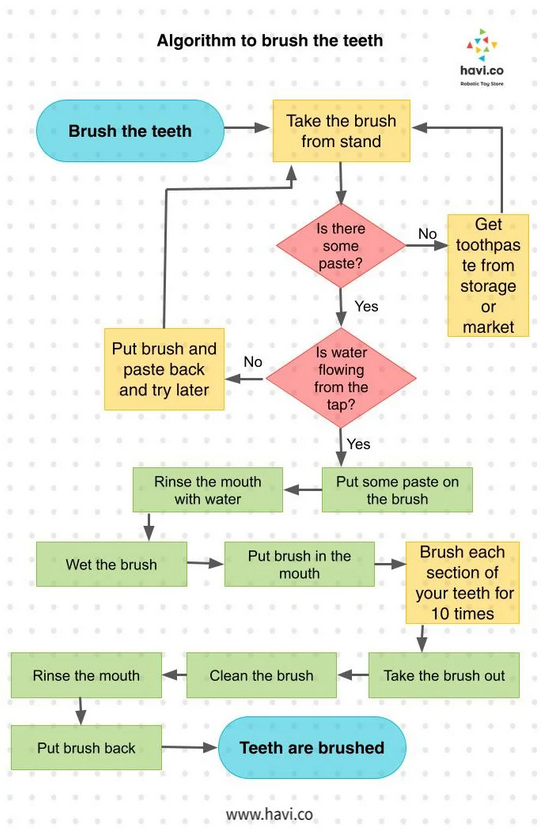CRITICAL THINKING (EN)
-
2. CRITICAL THINKING AND SOCIAL MEDIA
-
Nowadays it’s crucial to understand the importance of differentiating between facts and opinions, as these two often get combined or mixed by outer sources. Influencing people’s minds by newspapers, radio, TV and now the Internet has been openly happening for a long time but only now we are facing it with such a huge impact. Social media are surrounding us wherever we go, whatever we do and are programmed to understand our needs better so they can show us the content we are interested in the most and therefore capture our full attention.
What is an algorithm?
An algorithm is a list of rules to follow in order to complete a task or solve a problem. There are many types of algorithms that are used in everyday life, for example:
Following a recipe:
Recipes are designed to help individuals be able to create a specific food by following a set of detailed instructions—just as an algorithm in computer science details steps to create replicable outcomes.
Brushing the teeth:
Crossing the road:

Making lemon juice:

What is an algorithm in social media?
Social algorithms exist to funnel certain kinds of content to specific audiences, encouraging people to spend more time on the platforms. They dictate the kinds of content a user can “discover” outside their own community. In the case of social media, the issue at hand is how to connect users with engaging and relevant content. The algorithms social platforms develop and use differ from network to network, and they’re continuously being refined to create a more successful experience.
How Do Social Media Algorithms Work?
All social algorithms use signals to indicate how much a user enjoys specific content. For example, if you comment, share, or like a piece of content, the algorithm will understand you enjoyed it and try to provide similar content.
On the other hand, if you stop watching a video a few seconds in or you hide a post (or, heaven forbid, block one), the algorithm will interpret these as negative signals and begin showing you less of this content.
Some platforms, including Instagram and Facebook, allow users to see why they’re seeing a certain piece of content. For example, it might say you’re seeing a post because you follow the poster, have liked their posts in the past, and engage with the account.
Regardless, each platform has its distinct focus, target audience, and post requirements. Plus, viewers have certain expectations for each platform. So each network alters their algorithms in slightly different ways to meet these expectations.
Exercise:
Each one of you has an account on some social media platform: Facebook, Twitter, Instagram, TikTok, etc. If all of you opened now, for example, Instagram app, you’d quickly realize that each one of you has completely different content on their dashboard. It seems only natural, especially after understanding what an algorithm is and how it works.
However, let’s consider what kind of mindset is created for every individual in such an environment.

Social media makes you see only those things you want to see, meanwhile completely erasing everything else and therefore giving you a sense of living in a bubble where everyone agrees with your views, likes the same food as you, enjoys the same movies as you—and utopian, cybernetic world which doesn’t really exist in the real world.
Whether we like it or not, there are always people who have different views, eat food you consider disgusting or give 5-stars in reviews of the movies you fell asleep on. Pretending they’re not here makes people more strict toward their opinions as the only rightful ones and lessens the tolerance to listen, speak or understand each other despite our differences.
- Let’s say your favorite car color is red. If you were wearing glasses which erased cars in every other color from your view, would it mean that they don’t exist?
- If somehow there was a black car in the parking lot, wouldn’t it stick out like a sore thumb?
Recommended to-watch: “Social Dilemma” (2020) – Netflix documentary:
“The platforms make it possible to spread manipulative narratives with phenomenal ease, and without very much money.”
“Before you share, fact-check. Consider the source. Do that extra Google. If it seems like it’s designed to push your emotional buttons, it probably is.”
-
How can social media affect your opinions?
Why is critical thinking important while consuming online content?
-
Fake news and false authorities.
Not-so-many years ago when you needed to check some information or learn about something, you’d either ask someone experienced in the subject or look in an encyclopedia or other available resources. Today, you’re bombarded by various pieces of information, often excluding each other without a clue on which is true. There’s been an increasing popularity of a trend where famous people (actors, singers, creators) are considered authorities in various fields without having a proper education on said subjects. And so, people often look upon them as a trustworthy source of knowledge.
- Whenever a celebrity recommends some kind of diet, there’s countless people willing to try it out and believing it to be the best for them instead of consulting it with a dietitian who knows said person’s health condition and preferences.
- Whenever a celebrity recommends a cosmetic, it’s considered to be better working than those without an advertisement from someone famous—no matter the personal features, skin type or natural tendencies.
- Whenever a celebrity recommends a movie or a book, it immediately becomes a bestseller, even though it can’t apply to everyone’s preferences.
- Whenever a celebrity recommends who to vote for in the upcoming elections, people often take their opinion for granted and believe it without a second thought, voting exactly as the famous person said.
It’s important to remember that the amount of followers doesn’t equal having a greater knowledge on certain subjects. Everyone should personally check all the given information based on their own preferences, views, health or knowledge. Otherwise, you can not only get misinformed but also unintentionally cause harm to yourself or others.
What is fake news?
Basically, fake news is exactly what’s called—false information. Nowadays, it’s mostly spread on the Internet and is used for two main reasons:
- To manipulate people into thinking in a certain way;
- To make fun of people who can believe it.
Just as it was with kids making false phone call jokes or ringing doorbells only to run away, some people tend to enjoy annoying others. Simple as that! It may not be as harmful as the first reason but it can still lead to misinforming people and therefore impact their thoughts and decisions.
The fake news term has become increasingly popular around 2017 (during presidential campaign in the US) and then again in 2020 (when the pandemic of COVID began). It’s easy to understand why those two major events, which affected most of the world, were the topic of false informations. Spreading lies to that amount made it almost impossible to learn what is the actual truth and so, it led to dividing communities more than before. People tend to pick one of the two options, forgetting about all the choices in the middle: for example, most people were either pro-vaccine or anti-vaccine. At both ends of those extremes, there was no place for hesitation or simply saying:
I dont’t know. I don’t have enough information to state my opinion just yet.
How to detect fake news?
- Check who is the author of the news—who is the owner of the company who wrote it? Who runs the editorial office?
- Read all the articles, not only the headlines. That way you’ll understand the context.
- Check this news in other sources. Sometimes simply putting it into Google might help—perhaps other websites/journalists are revealing more details? Or was there something omitted?
- Find the publication date to see if it's actual information and not an old article.
- Make sure it’s not a joke or satire.
- Consider your personal prejudices. Are they affecting the way you receive the news?
- Ask an expert. Finding a person who possesses a better understanding of a certain subject will surely be of help!
Other useful tips:
- Is this news posted on a reliable website or verified profile on social media?
- Is the website address suspicious in any way?
- Pay attention to the grammar! It’s very common for fake news creators to use simplified language or make grammar mistakes. Educated journalists and authors always use proper language in their publications.
- The above applies also to other ways of scamming (deceiving): if you receive SMS from an unknown number reminding you to pay for electricity bill and there’s no dots or commas in the text (or too many of them in places they shouldn’t be in), there must be something wrong! If you have any doubts, check it with your local energy suppliers—better safe than sorry.
- And last but not least—think about the emotions you feel when reading an article. Is it making you angry? Sad? Fake news often rely on manipulating people’s emotions and the negative ones are usually easier to bring. Consider if an article was made to feel you that way? Was it supposed to make you emotional to get your reaction? Is it provoking?
Exercise:
To better understand how easy it can be for people to spread false informations, try making up your own. Think of a subject and add an action or event to it—move the audience with emotional content. And remember: negative emotions tend to last longer and leave stronger impact.
For example: The director of local school revealed that the money recently received will be used for a makeover of the teachers' lounge instead of the small, crumpled cafeteria for students.
Fake fundraisings.
Nothing moves people’s hearts as much as hungry children, abandoned animals, poverty or cruelty. Naturally, a lot of them want to help and decide to pay a small amount for the charity. It’s a good deed, praiseworthy, but it’s important to remember that critical thinking should be used even—or especially—when it comes to the topic that is making you emotional. Above, there was manipulation based on anger. Let’s talk about manipulation based on pity.
In 2024 there were massive floods in southern Poland. Many volunteers decided to help and lend a hand after, to clean and rebuild destroyed buildings, streets and properties. A lot of them saved animals too—no matter if they were dogs or hedgehogs. And so, as the spirit of community raised, suddenly there appeared a lot of fundraisings to help the victims of the flood. A lot of them were real but there was also plenty of fake ones, created by greedy people who wanted to use manipulation on pity for their own gain. In cases like that or literally any other situations where money are supposed to go for charity, it’s important to use critical thinking to verify if someone is not trying to rob you.
How to detect fake fundraisers?
- Verify the source: many of the fundraising websites demand some kind of verification to be able to gather money, like author’s ID or medical documents in case of looking for money for a surgery. Check those informations twice before donating.
- Look for the author of the fundraising. Is it some known organization or place, like your local zoo, library, school or orphanage? Maybe a popular activist? If you’re not sure about the source, perhaps it’d be better to donate to someone more reliable.
- Stick to the advices under the Fake news topic. They can apply here also.
What is phishing?
Phishing is a way of deceiving people into revealing sensitive information or installing viruses on their devices. The main goal is to get access to your bank account or personal informations which would allow the scammers to use your identity. It’s usually a form of masking and pretending to be someone else: your bank, your energy supplier etc. The technique can be relatively easy (sending fake messages or letters reminding you about ‘overdue payment’) or very elaborated (creating websites to make you reveal your passwords or believe you’re actually making the payment on the right website). You can think of it as putting on a mask of a good friend. Seems familiar, but the longer you look, the more differences you notice…
A lot of companies run their own actions against phishing. For example, your bank surely is reminding you a lot about never sharing your password or card number and code, even if you’re talking with someone from their hotline. Actual people working there would never ask for such things and you can never be sure who is really on the other side of the phone.
Example of phishing:

A phishing attack typically starts with an email that claims to be from a legitimate website, like a banking website or online store.

The goal of the email is to obtain private data from the user, so it either asks the recipient to reply with personal information or it links to a website that looks remarkably like the original site.
If the user is convinced and enters private details on the site, that data is now in the hands of the attacker! If the user filled in login details, they can then use those credentials to log in to the real website, or if the user provided credit card details, they can use the credit card to make purchases anywhere.
Signs of phishing:

Phishing emails will often come from addresses at domains that don't belong to the legitimate company.

Phishing emails will often link to a website with a URL that looks legitimate but is actually a website controlled by the attacker.
Attackers use a variety of strategies to make tempting URLs:
- Misspellings of the original URL or company name. For example, "goggle.com" instead of "google.com".
- Subdomains that look like the domain name. For example, "paypal.accounts.com" instead of "accounts.paypal.com". PayPal owns the second domain, but they have no control over the first.
- A different top level domain (TLD). For example, "paypal.io" versus "paypal.com". Popular companies try to buy their domain with the most common TLDs, such as ".net", ".com", and ".org".

Any website that is asking you for sensitive information should be using HTTPS to encrypt the data sent over the Internet. Phishing websites don't always go through the extra effort to use HTTPS.

Phishing emails will often ask you to either reply with personal information or fill out a form on a website. Most legitimate companies do not need you to verify personal information after the original account creation.

Phishing emails use psychological manipulation to lower our guard and get us to respond quickly without thinking through the consequences.
Every phishing scam will vary in its sophistication, so some emails may be very obviously fake while other emails can be incredibly convincing.
If you ever suspect an email is a phishing attack, do not click on any links or download any attached files.
Find another way to contact the supposed sender to see if the email is legit. If the email's from a company, you can search online for their phone number. If it's from a friend or colleague, you can message them or give them a call.
-


